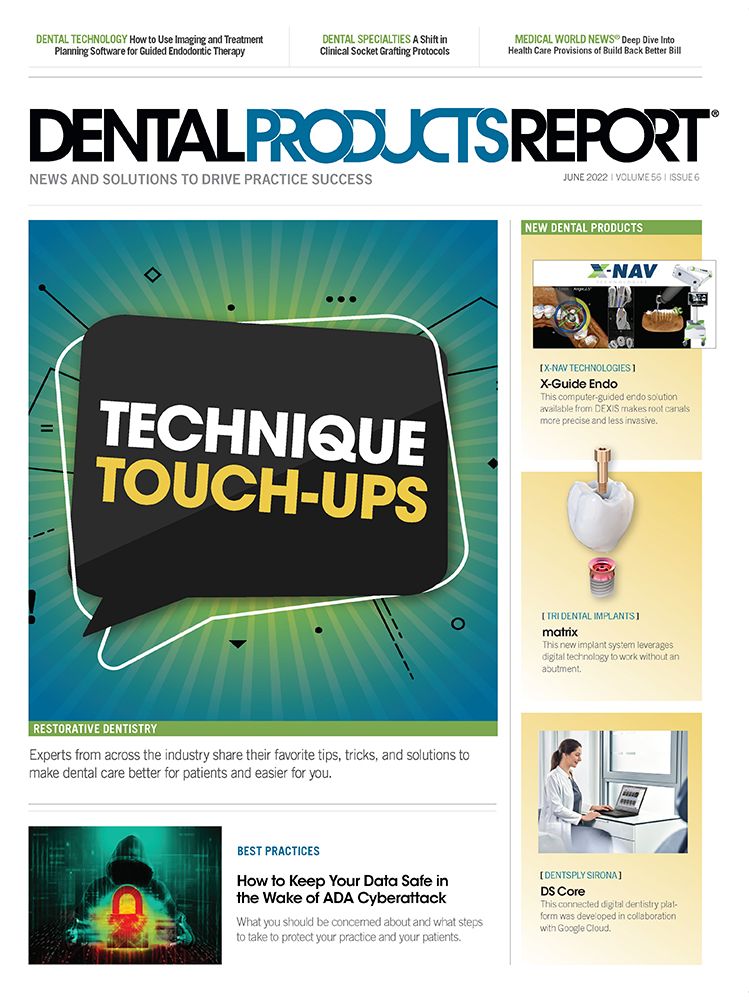Futureproof Your Dental Business in 2022 and Beyond
These 3 tips and insights will help dental service organizations and practice owners optimize their business for the future.
Futureproof Your Dental Business in 2022 and Beyond. Photo courtesy of Andrey Popov/stock.adobe.com.

Ask a dentist why they got into the business of caring for people’s teeth, and they won’t typically tell you: “For the thrill of it all.” Correctly or incorrectly, dentistry doesn’t have a reputation for setting pulses racing — but the truth of the matter is that there’s never been a more exciting time to be in the dental care space.
The numbers speak for themselves: right now, the dental industry is going gangbusters, with rapid growth paired with equally rapid consolidation. It’s no exaggeration to say that we’re in the middle of a major reconfiguration of American dental care, with dental service organizations (DSOs) unifying individual practices and making it possible to deliver high quality dental care to more people, more conveniently, more profitably, and in new and innovative ways.
Part of what makes this an exciting and nerve-wracking time is that the benefits of this transformation won’t accrue equally to everyone in the industry. Some dentists will resist the changes now sweeping our industry or will fail to adapt and wind up getting left behind. Others will embrace change and surge ahead, positioning themselves to enjoy bigger profits and deliver better treatment in coming months and years.
So how can group practices ride this wave and remain competitive in today’s fast-changing dental industry? There are 3 key steps that every practice should take:
Get Your Books in Order
For any dental business, the path to scale begins with some paper-shuffling. The accounting practices you’ve used to run your business until now likely aren’t designed for a fast-growing company, so it’s important to take a close look at your books as you prepare for growth.
If you eventually seek to take on institutional capital investment to help grow your organization, you’ll need to make sure you’re using generally accepted accounting principles (GAAP) to manage your business. That includes shifting from cash-based accounting to accrual-based accounting — essentially, counting the money you’re owed as an asset for the purposes of documenting your company’s value and current financial health. Virtually all private-equity firms use accrual-based accounting for the businesses they invest in, and to win investments you’ll need to make sure you’re talking their language.
As part of the process of reviewing your books, look out for areas where you can sensibly reduce overhead and increase your collection rate. Don’t take a slash-and-burn approach to cost-cutting but do bear in mind that any gains you can capture by operating efficiently and maximizing incoming revenues will scale alongside your growing business.
If You Can’t Measure it, You Can’t Manage It
For any growing DSO, communication and coordination are key. The aim is always to ensure that your business is more than the sum of its parts — and one common mistake that dental businesses make is to allow growth to lead to sprawling complexity rather than streamlined efficiencies.
One key area to watch for is data interoperability. Dentistry is increasingly data-driven, with clinicians using patient records, radiography, clinical data, and other key insights to deliver the best possible care to their patients. As practices expand and seek to scale, it’s vital to ensure that data is accessible by all stakeholders, and that it can be coordinated in ways that add value for everyone and ultimately lead to better patient care.
Connecting the dots isn’t just about point-of-care services, either. Practices also need to ensure that admin staff have the tools and resources they need to manage patients across multiple locations and care providers. With the right infrastructure — up to and including artificial intelligence (AI) tools that can flag patients who need appointment reminders, or who should be prompted to make payments when they attend your offices — it’s possible to maximize results and keep everything running smoothly as you grow.
Futureproof your Technology
Finally, dental businesses need to make sure that they’re investing early in the tech they’ll need to operate at scale. That might sound counterintuitive, especially if your growth is through acquisition: part of the reason you’re seeking to scale up, after all, is to get access to better resources, including the latest technology. But the reality is that the longer you wait to introduce new tech, the more complex that transition becomes.
After all, every individual practice that joins your group will likely already have some kind of practice management solution in place, and will already have record-handling systems or billing tools. If you move early to standardize those tools across your practices, you’ll find it’s far easier to onboard new practices and deliver the communication and coordination that’s needed to grow fast and capture new economies of scale.
Wait too long, on the other hand, and you’ll find that managing friction between your organization’s different tech tools can become all-consuming. The more institutional momentum you acquire, and the bigger you grow, the harder it becomes to introduce effective whole-organization tech programs — so lay the groundwork early on and build out the tech infrastructure you’ll need down the line.
Are You Excited Yet?
The bottom line is that this is an incredibly exciting time to be a dental practitioner and a business owner, but exciting times bring both opportunities and risks. It’s important to acknowledge the risks while you move to make the most of the opportunities, and to put the back-end systems and technologies in place now that you’ll need to scale up in a sustainable and effective way.
The key is that to grow your business, you need to get organized now, before your organization starts to scale. This is ultimately a bit like dentistry itself: it’s far better to spot and address problems early on, before decay sets in, than to wait until the pain starts before you try to fix things. Plan ahead, and practice good organizational hygiene, and you can build out the infrastructure that will help you to scale in the months and years to come.
